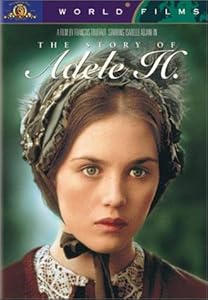by Dean | Oct 7, 2019 | General
Francois Truffaut’s French picture, The Story of Adele H. (1975), is a partly fictitious period piece about Adele Hugo’s unending pursuit of a British lieutenant with whom she once had a romance. (Adele was the daughter of Victor Hugo.) He doesn’t want her, but she obsessively wants him.
The idea was long ago expressed that there is in the one who obsessively and relentlessly loves a person unworthy of that love not only pathology but also greatness. Critic John Simon pointed out that in Adele H. Truffaut failed to see this, and so his heroine’s greatness is casually ignored. This is too bad, but at least the film has themes and beauty and is highly interesting.
Are there people who turn amatory love into a religion? Sure. They’re everywhere. This is one of the themes in the film. Isabelle Adjani enacts Adele and is perfect, supplying the character’s remoteness, determination and sheer fragility. The British lieutenant is too cold—played well enough, however, by Bruce Robinson. Truffaut’s direction is gratifyingly good, with those charming fadeouts and wipes included. The costumes by Jacqueline Guyot and the production design by Jean-Pierre Kohut-Svelko are winning.
Somewhat underrated by critics, The Story of Adele H. needs to be given its due.
(In French with English subtitles.)

Cover of The Story of Adele H.
by Dean | Oct 5, 2019 | General
Michael Curtiz (director) and Dudley Nichols (scriptwriter) gave us 1959’s The Hangman, a riveting Western about a U.S. marshal out to arrest a popular man. Marshal Bovard (Robert Taylor) is dedicated to his job and distrustful of people, although he becomes a little less distrustful near the movie’s end. The man he’s after, to be sure, rightly knows that a jury will probably pronounce him guilty when he isn’t. There is constantly a specter of legal injustice.
What is most stellar about this movie is the cast, usually because of how inherently interesting and good-looking it is. Taylor’s virility can rattle any cage. Tina Louise, though limited as an actress, is effectually, amicably sensual and has a charming beauty. Mickey Shaughnessy, Mabel Albertson and even Jack Lord all have their appeal. So does Nichols’s relatively simple if imperfect script. The Hangman is a respectable addition to the Curtiz oeuvre (which includes Casablanca).
by Dean | Oct 2, 2019 | General
An Australian film, Winter of Our Dreams (1981), concentrates on a bookseller, Rob (Bryan Brown), who cheats on his wife, and now the two maintain what amounts to an open marriage. Following the suicide of a former girlfriend, Rob wishes to talk about the woman to her friend Lou (Judy Davis), a prostitute and a junkie. Lou becomes attracted to Rob and to a sexual relationship with him that promises nothing. None of the characters finds the close consorting they effect very fulfilling.
During the “winter of our dreams,” people’s dreams are frozen; they go nowhere, they are unfulfilled. This is particularly true for Lou, comforted at the end only by the melody of a song she hears at an anti-Bomb gathering. John Duigan‘s film—written and directed by him—is astute and meaningful. He stays away from longueurs, and his flick is not tedious. Smooth Brown doesn’t have much to do, but Miss Davis does. She is a fleshy wonder, convincing as a druggie who goes straight; fascinatingly fragile. The film lives because of Duigan first, Davis second.
by Dean | Sep 30, 2019 | General
Jean Seberg is the star of a 1961 French film, The Five Day Lover, wherein she plays the mistress—a married one with children—of the currently unemployed Antoine (Jean-Pierre Cassel), regularly kept by his lover (Micheline Presle).
This is a Philippe de Broca movie, with some of the French New Wave’s froth, and it treats infidelity as lightly as it does romantic love in general. That’s a problem. What’s more, if this is a comedy, it’s nearly devoid of laughs. Yet Lover is an artistically tasteful, genuinely romantic production—neither very strong nor a failure. The main actors are careful and endearing. . . But, again, not very strong; and, in point of fact, I suspect it has weakened with time.
(In French with English subtitles)
by Dean | Sep 27, 2019 | General
David Lynch built a G-rated movie, The Straight Story (1999), around the event of 73-year-old Alvin Straight taking a trip by riding mower to visit his stroke-afflicted brother. The trip, in 1994, began in Iowa and ended in Wisconsin. A gentle picture with humor, it was meant to be deeply moving, and it is. It concerns people, viz. Alvin and his daughter Rose, who have somehow endured. The sentimentality with which Alvin (a perfect Richard Farnsworth) speaks of family is something he does not possess regarding old age, and neither does the film.
Lynch was content to forgo the elements of sex and nudity and violence and profanity this time lest they prevent an audience from “feeling” something. For his next film, Mulholland Drive (2001), he went back to sex and nudity but this picture, too, can be moving, as well as sad. But Lynch was going backwards; unlike The Straight Story, Mulholland Drive is a clunker.




